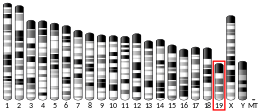NKX2-3
Homeobox protein Nkx-2.3 is a protein that in humans is encoded by the NKX2-3 gene.[5][6][7]
NKX2C is a member of the NKX family of homeodomain-containing transcription factors, which are implicated in many aspects of cell type specification and maintenance of differentiated tissue functions.[7]
References
- ^ a b c GRCh38: Ensembl release 89: ENSG00000119919 – Ensembl, May 2017
- ^ a b c GRCm38: Ensembl release 89: ENSMUSG00000044220 – Ensembl, May 2017
- ^ "Human PubMed Reference:". National Center for Biotechnology Information, U.S. National Library of Medicine.
- ^ "Mouse PubMed Reference:". National Center for Biotechnology Information, U.S. National Library of Medicine.
- ^ Price M, Lazzaro D, Pohl T, Mattei MG, Ruther U, Olivo JC, Duboule D, Di Lauro R (Mar 1992). "Regional expression of the homeobox gene Nkx-2.2 in the developing mammalian forebrain". Neuron. 8 (2): 241–55. doi:10.1016/0896-6273(92)90291-K. PMID 1346742. S2CID 22766848.
- ^ Pabst O, Schneider A, Brand T, Arnold HH (Jul 1997). "The mouse Nkx2-3 homeodomain gene is expressed in gut mesenchyme during pre- and postnatal mouse development". Dev Dyn. 209 (1): 29–35. doi:10.1002/(SICI)1097-0177(199705)209:1<29::AID-AJA3>3.0.CO;2-Z. PMID 9142493.
- ^ a b "Entrez Gene: NKX2-3 NK2 transcription factor related, locus 3 (Drosophila)".
Further reading
- Harvey RP (1996). "NK-2 homeobox genes and heart development". Dev. Biol. 178 (2): 203–16. doi:10.1006/dbio.1996.0212. PMID 8812123.
- Pabst O, Zweigerdt R, Arnold HH (1999). "Targeted disruption of the homeobox transcription factor Nkx2-3 in mice results in postnatal lethality and abnormal development of small intestine and spleen". Development. 126 (10): 2215–25. doi:10.1242/dev.126.10.2215. PMID 10207146.
- Phiel CJ, Gabbeta V, Parsons LM, et al. (2001). "Differential binding of an SRF/NK-2/MEF2 transcription factor complex in normal versus neoplastic smooth muscle tissues". J. Biol. Chem. 276 (37): 34637–50. doi:10.1074/jbc.M105826200. PMID 11457859.
- Biben C, Wang CC, Harvey RP (2003). "NK-2 class homeobox genes and pharyngeal/oral patterning: Nkx2-3 is required for salivary gland and tooth morphogenesis". Int. J. Dev. Biol. 46 (4): 415–22. PMID 12141427.
- Strausberg RL, Feingold EA, Grouse LH, et al. (2003). "Generation and initial analysis of more than 15,000 full-length human and mouse cDNA sequences". Proc. Natl. Acad. Sci. U.S.A. 99 (26): 16899–903. Bibcode:2002PNAS...9916899M. doi:10.1073/pnas.242603899. PMC 139241. PMID 12477932.
- Deloukas P, Earthrowl ME, Grafham DV, et al. (2004). "The DNA sequence and comparative analysis of human chromosome 10". Nature. 429 (6990): 375–81. Bibcode:2004Natur.429..375D. doi:10.1038/nature02462. PMID 15164054.
- Gerhard DS, Wagner L, Feingold EA, et al. (2004). "The Status, Quality, and Expansion of the NIH Full-Length cDNA Project: The Mammalian Gene Collection (MGC)". Genome Res. 14 (10B): 2121–7. doi:10.1101/gr.2596504. PMC 528928. PMID 15489334.
This article incorporates text from the United States National Library of Medicine, which is in the public domain.



